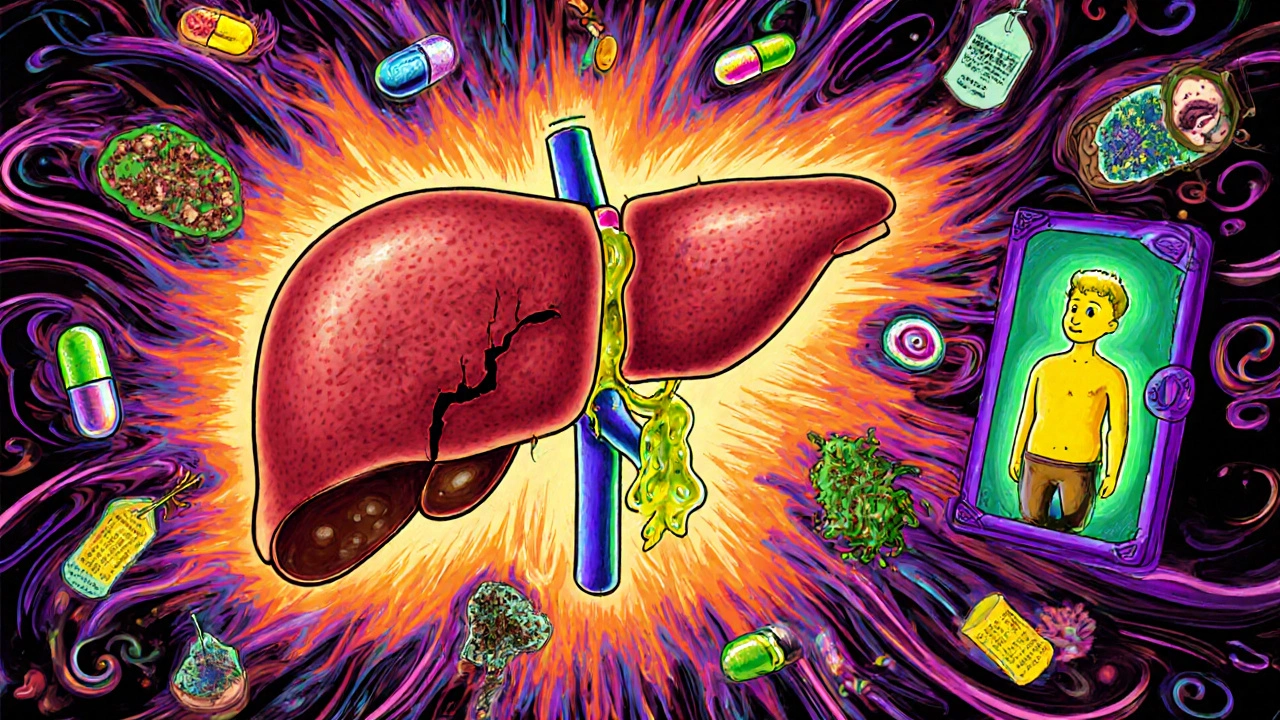
Medication Liver Risk Checker
This tool helps you assess your risk of medication-related liver damage based on your current medications, supplement usage, and other health factors. It is not a substitute for medical advice.
Important: If you experience any symptoms of liver damage (itching, dark urine, light-colored stools, nausea, abdominal pain, or extreme fatigue), seek medical attention immediately.
Most people assume that if a drug is prescribed or sold over the counter, it’s safe. But your liver doesn’t care if it’s a pill from your doctor or a bottle of turmeric from the health store. Medication-related liver damage is real, rising, and often missed until it’s too late. In the UK and US, it’s now the leading cause of acute liver failure - even beating viral hepatitis. And the worst part? You might not feel anything until your skin turns yellow, your urine turns dark, or you’re lying in a hospital bed wondering how you got there.
What Actually Causes Liver Damage from Medications?
It’s not just about overdosing. Even normal doses of common drugs can hurt your liver. Antibiotics like amoxicillin-clavulanate are the top offenders, making up over 16% of cases. But it’s not just prescription meds. Herbal supplements, vitamins, and weight-loss teas are behind 20% of liver injury cases in the UK alone. Green tea extract? It’s responsible for nearly 4 out of every 10 supplement-related liver injuries. And acetaminophen - the active ingredient in Tylenol - is the most common cause of sudden liver failure in the US. One extra pill a day, or mixing it with alcohol, can push your liver over the edge.
Some drugs cause damage because they’re toxic at high levels. Acetaminophen is like that - too much overwhelms your liver’s detox system. Others, like flucloxacillin or isoniazid, trigger an unpredictable immune reaction. That’s why two people can take the same drug, and only one gets hurt. Genetics play a role too. If you carry the HLA-B*57:01 gene, your risk of liver damage from flucloxacillin jumps 80 times. You won’t know unless you’re tested.
The Hidden Signs - Before It’s Too Late
Most people wait for jaundice - the yellow skin and eyes - before they worry. By then, the damage is often severe. The real warning signs come earlier, and they’re easy to ignore.
- Itching without a rash - especially on your palms or soles. This isn’t dry skin. It’s bile building up in your blood.
- Dark urine - like cola or tea. Your liver isn’t filtering waste properly.
- Light-colored stools - pale, clay-colored, or floating. That means bile isn’t reaching your intestines.
- Unexplained nausea or vomiting - not from food poisoning or a stomach bug.
- Right upper belly pain - dull, constant, or sharp under your ribs on the right side.
- Extreme fatigue - not from lack of sleep. This is the kind that makes you feel like you’re dragging through wet concrete.
These symptoms usually show up within 1 to 8 weeks after starting a new medication. For antibiotics, it’s often around day 15. For herbal supplements, it could be 3 months in. The delay tricks people into thinking it’s something else - a virus, stress, aging. A 2023 survey found that 68% of patients were misdiagnosed at first. One woman in Leeds spent 6 weeks thinking her fatigue was menopause, until her ALT levels were 15 times higher than normal. She’d been taking green tea capsules for weight loss.
When to Go to the Emergency Room - No Excuses
Don’t wait for your GP appointment if you’re seeing multiple red flags. The American College of Gastroenterology says: if you have jaundice and any two of these - dark urine, right upper pain, or nausea/vomiting - and you started a new medication in the last 8 weeks, go to A&E now.
For acetaminophen overdose, time is everything. If you took too much - even just a few extra pills - and it’s been less than 8 hours, get to a hospital immediately. N-acetylcysteine, the antidote, works best within that window. Every hour you wait cuts its effectiveness by 10%. After 24 hours, it’s often too late to save your liver.
Don’t think, “I only took one extra.” People think they’re safe because they didn’t take 20 pills. But liver damage doesn’t need a massive overdose. One person took 3,000 mg of acetaminophen a day - the official limit - for 10 days while drinking wine. Their liver enzymes skyrocketed. They needed a transplant.
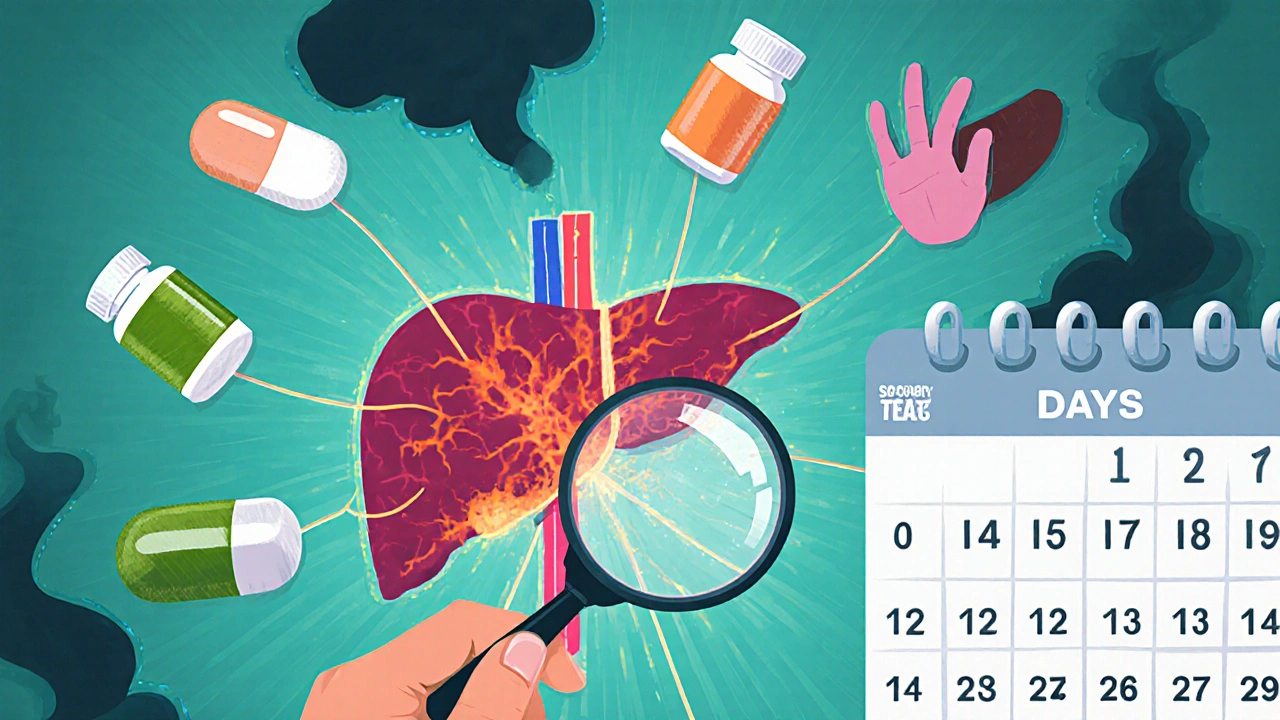
Supplements Are Not Safe Just Because They’re Natural
“It’s herbal, so it’s fine,” is the most dangerous myth in this space. The British Liver Trust says supplements cause 1 in 5 cases of drug-induced liver injury. Kava, green tea extract, weight-loss teas, and even “liver cleanse” powders are on the list. These products aren’t regulated like medicines. No one checks their purity, dosage, or safety. A 2024 Reddit thread from UK users showed 29% of DILI cases were tied to supplements - and nearly half of those users had no idea they were at risk.
One man in Birmingham took a “natural testosterone booster” for 6 weeks. He felt great - until he couldn’t get out of bed. His bilirubin was 12 times normal. His doctor said, “This is the worst supplement-induced liver injury I’ve seen this year.” He’s still recovering.
There’s no such thing as “detoxing” when your liver is failing. That’s just a marketing lie. Your liver doesn’t need “cleansing.” It’s already the body’s natural detox system. When supplements hurt it, they’re not helping - they’re poisoning it.
What You Can Do to Protect Yourself
Prevention isn’t about avoiding all meds. It’s about being smart.
- Know your limits - Never exceed 3,000 mg of acetaminophen a day. If you have liver disease, cut that to 2,000 mg. And never mix it with alcohol - that triples your risk.
- Keep a medication log - Write down every pill, patch, capsule, and herbal tea you take. Include the dose and start date. Bring it to every doctor visit.
- Ask about liver risk - When a new drug is prescribed, ask: “Can this hurt my liver? Should I get blood tests?”
- Monitor high-risk drugs - If you’re on isoniazid (for TB), anticonvulsants, or certain antibiotics, your doctor should check your liver enzymes every 2-4 weeks.
- Stop supplements cold - If you’re taking anything not prescribed, and you feel off, stop it. Don’t wait. Get tested.
There’s a new app called DILI-Alert that’s been approved by the FDA. It lets you scan your meds and instantly shows if they’re linked to liver damage. It’s not perfect, but it’s a tool. Use it.
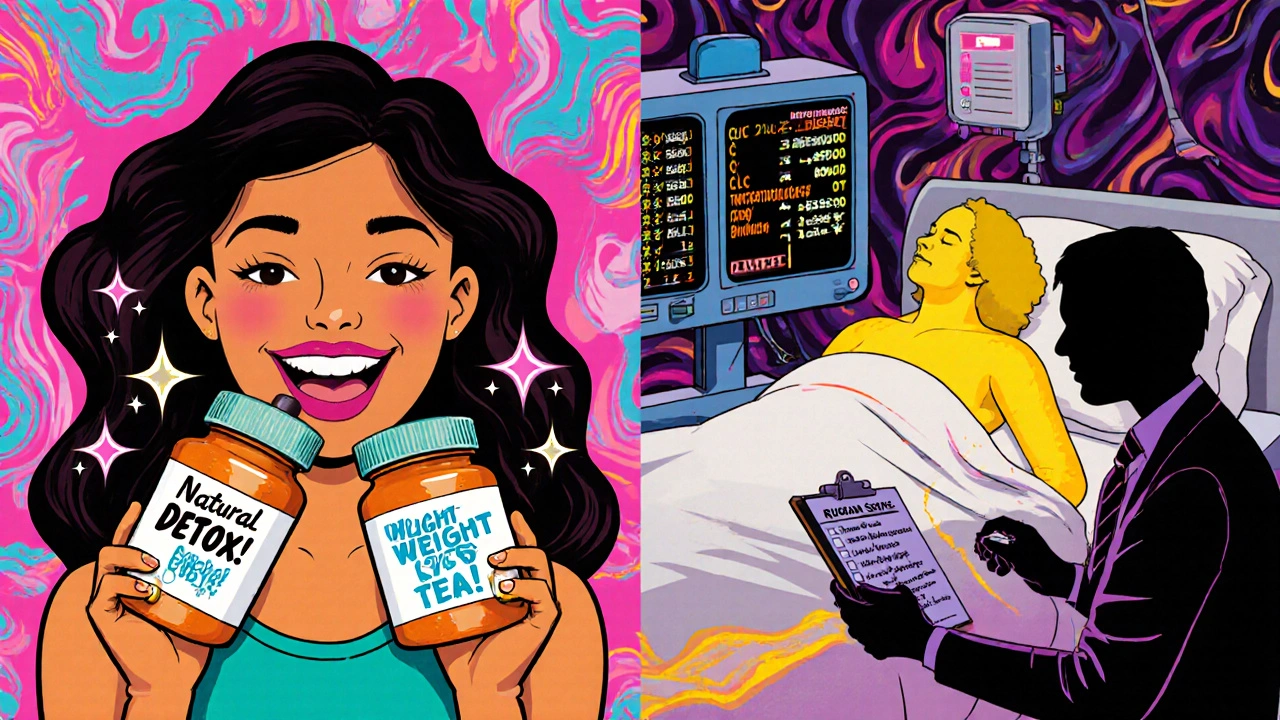
Why Doctors Miss This - And How to Make Sure You’re Heard
Only 42% of primary care doctors can correctly name the top 5 drugs that cause liver injury. Many still think statins are the main risk - but the European Association for the Study of the Liver says serious damage from statins is extremely rare. Meanwhile, antibiotics and supplements fly under the radar.
Don’t let a doctor brush off your symptoms. If you say, “I’ve been itching and tired since I started this,” and they say, “It’s probably stress,” push back. Say: “I’ve read that this drug can cause liver damage. Can we check my liver enzymes?”
The RUCAM score is the gold standard for diagnosing drug-induced liver injury. It’s not a fancy machine - it’s a checklist doctors use to match your symptoms, timing, and meds. If they haven’t used it, they haven’t done a full job.
It’s Not Just About You - It’s About Awareness
Drug-induced liver injury is rising. Between 2015 and 2022, cases in Europe jumped 27%. In the US, hospitalizations rose by 45% in a decade. And it’s mostly preventable. If you take a new medication and feel different, don’t ignore it. Don’t assume it’s normal. Don’t wait for jaundice. Your liver can’t scream - but it can fail silently.
Speak up. Test early. Stop risky supplements. Know your meds. One conversation with your doctor, one blood test, one decision to stop a supplement - could save your life.
Can over-the-counter painkillers cause liver damage?
Yes. Acetaminophen (Tylenol) is the most common cause of sudden liver failure in the US. Even taking the recommended dose for too long - or mixing it with alcohol - can be dangerous. Never exceed 3,000 mg per day. If you have liver disease, keep it under 2,000 mg. Ibuprofen and other NSAIDs can also cause liver stress, especially with long-term use or existing liver conditions.
Are herbal supplements safer than prescription drugs for the liver?
No. Herbal and dietary supplements cause 20% of all medication-related liver injuries in the UK. Green tea extract, kava, and weight-loss teas are frequent culprits. Unlike prescription drugs, supplements aren’t tested for liver safety before being sold. Labels can be misleading, and dosages vary wildly. What’s labeled “natural” doesn’t mean “safe.”
How long does it take for liver damage to show up after starting a new drug?
It varies. Antibiotics like amoxicillin-clavulanate often cause damage within 1-8 weeks, with symptoms appearing around day 15. Anticonvulsants can take up to 6 weeks. Herbal supplements have the widest range - anywhere from 1 week to 12 months. Acetaminophen overdose shows signs within 24 hours. The key is timing: if symptoms start after beginning a new medication, suspect liver damage.
Can liver damage from medication be reversed?
Yes, if caught early. Stopping the offending drug often allows the liver to heal on its own. Many people recover fully within weeks to months. But if damage is severe - especially if jaundice, confusion, or bleeding occur - it can lead to acute liver failure. In those cases, a transplant may be the only option. Early detection is everything.
Should I get my liver checked before starting a new medication?
It’s not always required, but it’s smart. If you’re starting a high-risk drug like isoniazid, anticonvulsants, or certain antibiotics, ask your doctor for a baseline liver function test. If you already have liver disease, diabetes, or drink alcohol regularly, testing before starting any new medication is strongly advised. A simple blood test can catch early signs before you feel anything.
What’s the best way to track what I’m taking to avoid liver damage?
Keep a written or digital list of every medication, supplement, and herbal product you take - including dose and start date. Include things like vitamins, fish oil, turmeric, melatonin, and CBD. Bring this list to every doctor’s appointment, even if you think it’s not important. Many liver injuries happen because doctors don’t know you’re taking something non-prescription. Apps like DILI-Alert can also help you scan your meds for liver risks.


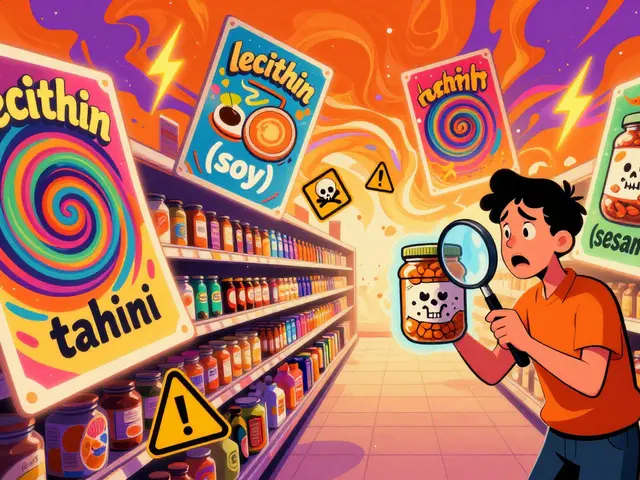
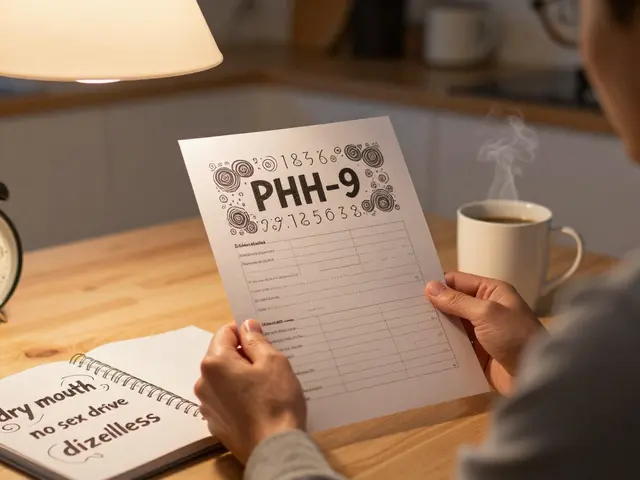

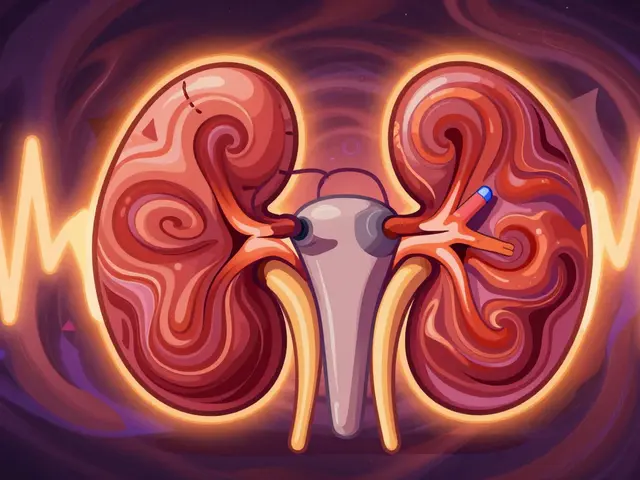
vanessa k
November 11, 2025 AT 03:34My sister took that green tea extract for weight loss and ended up in the ER with jaundice. No warning. No pain. Just exhaustion and dark urine for weeks. Doctors thought it was flu. Turned out her ALT was through the roof. I wish I'd known this sooner. Stop assuming 'natural' means safe.
manish kumar
November 12, 2025 AT 11:03Let me tell you something about liver damage that nobody talks about - it’s not just about the drugs or supplements themselves, it’s about the cumulative effect of daily micro-toxins we all ignore. One extra Tylenol here, a detox tea there, a new vitamin stack every month - it’s like slowly pouring acid into your body and pretending it’s just a bump in the road. Your liver doesn’t have a voice, but it screams in enzymes and bilirubin. And by the time you notice, it’s already screaming into a void. Don’t wait for the yellow skin. Check your blood. Track your meds. Be the person who asks the hard questions before it’s too late.
Nicole M
November 13, 2025 AT 19:16I started taking turmeric capsules last year for joint pain. Never thought twice. Then I got this weird itching on my palms that wouldn’t go away. My doctor didn’t even blink until I mentioned the supplements. Turned out my liver enzymes were elevated. I stopped everything. Two months later, back to normal. This post saved me. Seriously.
Arpita Shukla
November 14, 2025 AT 05:12Actually, the data on supplement-related liver injury is overstated. Most studies are retrospective and rely on self-reporting. Many cases are misclassified - people confuse herbal products with contaminants or adulterated products. The real issue is unregulated black-market supplements, not legitimate herbal extracts. Green tea extract is only dangerous in high-dose isolates, not brewed tea. And acetaminophen toxicity is almost always intentional overdose or alcohol interaction - not therapeutic use. This post is fearmongering disguised as education.
Benjamin Stöffler
November 15, 2025 AT 23:25Let’s be clear: the liver is not a sponge; it is a metabolic powerhouse, a biochemical refinery, a silent sentinel - and yet, we treat it like a trash can we can dump anything into, because ‘it’s natural,’ or ‘it’s OTC,’ or ‘everyone else is doing it.’ We’ve normalized self-medication as self-care, and in doing so, we’ve turned our most vital organ into a casualty of convenience. The real tragedy? It’s not the drugs. It’s the arrogance. The belief that biology is optional.
Mark Rutkowski
November 16, 2025 AT 10:41There’s a quiet heroism in listening to your body before it screams. Most of us wait for the alarm - the yellow skin, the dark urine - but the real courage is in noticing the whisper: the fatigue that won’t quit, the itch that makes no sense, the nausea that doesn’t match your last meal. That’s your liver trying to talk. Not begging. Not crying. Just… whispering. Don’t ignore the whisper. It’s the only warning you’ll ever get.
Ryan Everhart
November 17, 2025 AT 04:05So let me get this straight - you’re telling me that if I take a supplement I bought off Amazon, and I feel tired, I should drop everything and go to the ER? But if I drink three beers and two Tylenol every night for a month, that’s just ‘weekend vibes’? Interesting. The real danger isn’t the pill. It’s the culture that tells us we’re invincible until we’re not.
David Barry
November 18, 2025 AT 14:3990% of these cases are preventable, but only if you’re the kind of person who reads the fine print. Most people don’t even know what ALT or AST stands for. They see ‘liver support’ on a bottle and assume it’s like taking a vitamin C. The problem isn’t the meds - it’s the public’s complete ignorance of basic physiology. This isn’t a medical issue. It’s an education crisis.
Alyssa Lopez
November 19, 2025 AT 09:35US citizens need to stop buying foreign supplements. The FDA doesn’t regulate them. They’re full of heavy metals and undisclosed pharmaceuticals. My cousin got liver failure from a ‘Ayurvedic’ weight loss pill from India. It had hidden sibutramine. This isn’t about ‘natural’ - it’s about borders. If you didn’t get it from a licensed pharmacy, don’t swallow it.
edgar popa
November 21, 2025 AT 01:50Stopped my turmeric pills after reading this. Felt better in 3 days. Thanks.
Eve Miller
November 21, 2025 AT 15:39It’s appalling that so many people treat their bodies like experimental laboratories. If you can’t be bothered to learn the basic risks of what you ingest, you don’t deserve to be healthy. This post should be required reading in high school biology. Not a suggestion. A mandate.
Chrisna Bronkhorst
November 22, 2025 AT 23:00My dad died from this. Took a ‘natural’ testosterone booster. No bloodwork. No questions. Just ‘it’s safe, bro.’ They found his liver was 80% necrotic. They didn’t even know he was taking it. Don’t be him.